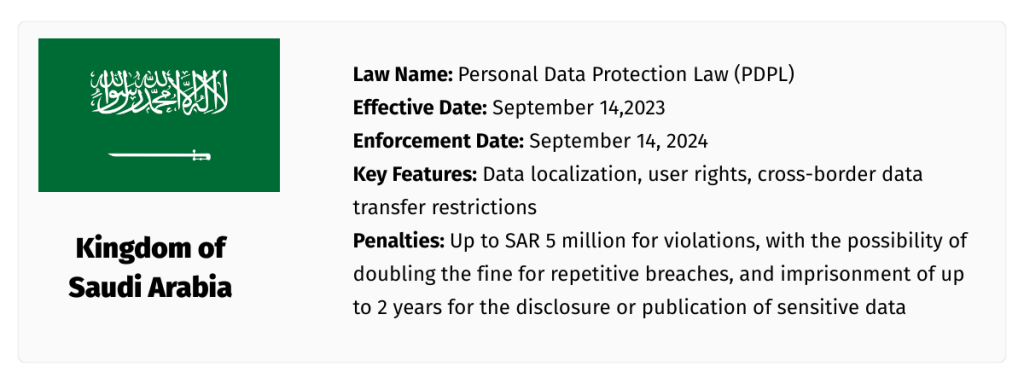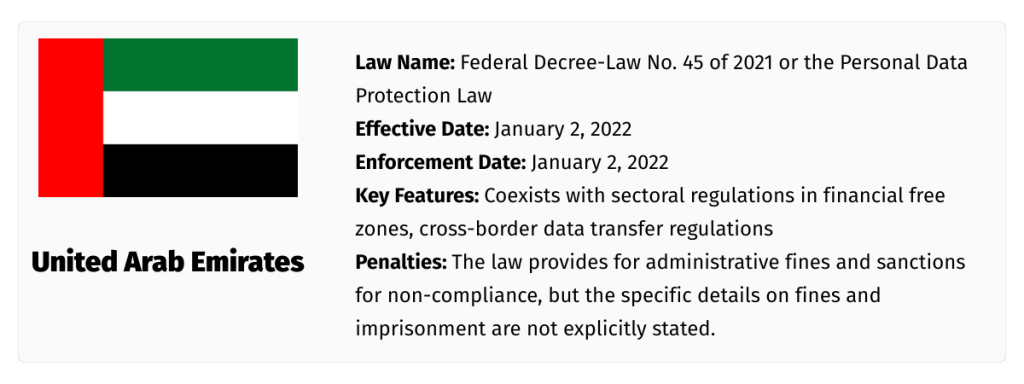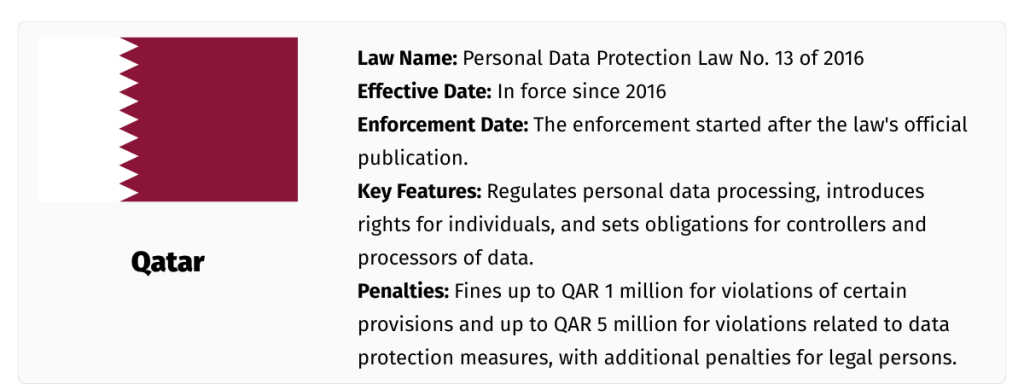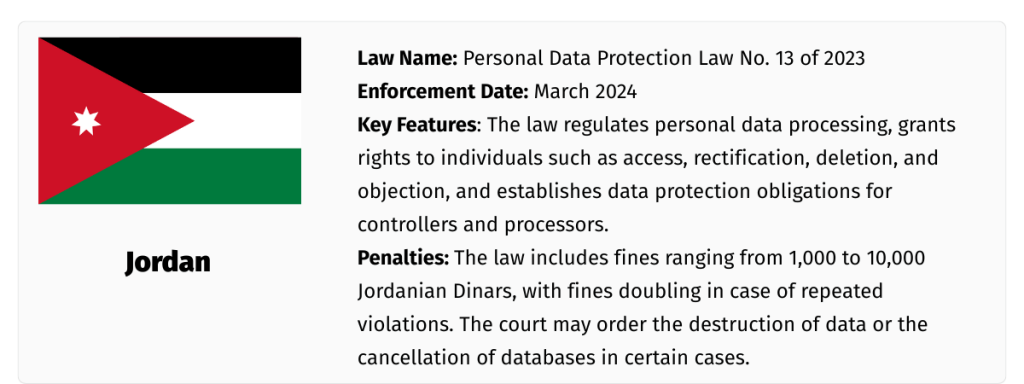Middle East Privacy
A new chapter in data privacy is being written across the Middle East—one that’s defined by momentum, modernization, and a growing emphasis on digital sovereignty.
In just a few short years, countries across the region have gone from having limited regulatory frameworks to implementing—or actively drafting—comprehensive data protection laws designed to govern the way personal data is collected, stored, processed, and transferred.
- Saudi Arabia’s Personal Data Protection Law (PDPL), emphasizing data localization and user rights, came into effect on September 14, 2023, with enforcement having commenced on September 14, 2024.
- The United Arab Emirates has enacted a federal data protection law that coexists with existing sectoral regulations in its financial free zones, creating a layered and evolving compliance environment.
- Qatar, one of the early adopters in the region, with Qatar’s Personal Data Privacy Protection Law, which came into effect in 2016.
- Jordan has enacted its own Personal Data Protection Law, with enforcement in effect as of March 16, 2025. The law takes a modern approach with specific obligations for data controllers and processors.
This wave of regulation isn’t just about catching up—it’s about building internal capacity, driving investment, and for some, aligning with national digital transformation agendas.
As more countries like —Kuwait and Oman—are already introducing data privacy frameworks, the region is laying the groundwork for a distinctly Middle Eastern model of privacy governance.
In this article, we’ll explore how the data privacy landscape across the Middle East is evolving, what makes these new laws unique, and what businesses need to prepare for as the region shifts from regulatory intent to enforcement reality.
The Strategic Drivers of Data Privacy Regulation in the Middle East
The rise in data privacy laws across the Middle East isn’t happening in a vacuum. It’s deeply tied to the region’s broader ambitions—economic, technological, and strategic.
These regulations aren’t just about protecting individuals’ rights; they’re part of a larger narrative around national digital autonomy and modernization.
1. Digital Transformation as National Policy
Major economies in the region—most notably Saudi Arabia and the UAE—have launched sweeping digital transformation initiatives.
Saudi Vision 2030 is a prime example: a top-down mandate to diversify the economy away from oil, with a massive push into tech, innovation, and data-driven services.
For these plans to succeed, governments need trusted digital ecosystems.
That means clear rules for data protection, better infrastructure for digital services, and stronger accountability from businesses handling personal data.
2. The Data Localization Imperative
With cloud migration accelerating across both public and private sectors, governments are becoming more assertive about where data lives.
Saudi Arabia’s PDPL, for example, places tight restrictions on cross-border data transfers, requiring organizations to keep personal data within national borders unless explicitly approved.
This push for data localization is a direct response to concerns over foreign surveillance, cyber threats, and loss of control over national datasets.
In short: if your country’s future is digital, you want your data physically close.
3. The Geopolitical Undercurrent
There’s also a growing skepticism toward global tech giants and their handling of personal data—especially in regions where local governance structures haven’t had much say in how data is collected, processed, or monetized by foreign companies.
The pushback against unrestricted data flows to the US and EU isn’t about isolationism—it’s about leverage.
Control over data means influence. It means power. And the Middle East isn’t looking to be a passive participant in the global digital economy.
Emerging National Frameworks – Diverse Models, Shared Intent
While inspired by global privacy norms, the data protection laws emerging across the Middle East are not copy-paste implementations of the General Data Protection Regulation (GDPR).
Each country is designing its own framework, shaped by national priorities, legal traditions, and digital strategies.
What they all share, however, is a clear intent: to establish meaningful control over data within their borders.
Here’s a closer look at how four countries in the region are approaching data protection:
1. Saudi Arabia: PDPL and the Push for Sovereign Control

Saudi Arabia’s Personal Data Protection Law (PDPL) is one of the most comprehensive in the region, and one of the most sovereignty-driven.
It imposes strict data localization requirements, meaning personal data must remain within the Kingdom unless specific conditions for cross-border transfers are met and approved.
Regulatory enforcement will fall under the Saudi Data and Artificial Intelligence Authority (SDAIA), signaling the country’s alignment of data policy with its AI and digital transformation strategies.
- Enforcement Date: The Personal Data Protection Law (PDPL) came into effect on September 14, 2023, with enforcement starting on September 14, 2024.
-
Key Feature: Cross-border transfers require prior approval
-
Focus: Localization, regulatory control, alignment with AI strategy and Vision 2030, building sovereign digital infrastructure
2. United Arab Emirates: A Layered and Sectoral Model

The UAE’s approach to data protection is complex by design.
Federal Decree-Law No. 45 of 2021 introduced baseline data protection standards across the country—but enforcement and supervision are managed by the UAE Data Office, with no single unified DPA.
Additionally, financial free zones like DIFC and ADGM operate under their own independent data protection laws, each modeled loosely on GDPR but tailored to their jurisdictions.
-
Enforcement Status: In force since January 2022
-
Key Feature: Multiple regulatory layers (federal + free zones)
-
Focus: Business alignment, cross-border investment appeal
3. Qatar: Early Mover, Now Gaining Enforcement Momentum

Qatar was the first GCC country to introduce a data protection law back in 2016. However, Law No. 13 of 2016 (also known as the Qatar Personal Data Protection Law) remained largely dormant. That’s changing now.
The Compliance and Data Protection (CDP) Department within the Ministry of Communications and Information Technology (MCIT) is now actively issuing guidance, conducting awareness campaigns, and signaling a shift toward enforcement.
-
Enforcement Status: In force; enforcement strengthening
-
Key Feature: Regulates personal data processing, introduces individual’s rights, sets obligations for controllers and processors.
-
Focus: Catch-up compliance, institutional trust
4. Jordan: A Modern, Principles-Based Approach

Jordan’s Personal Data Protection Law (PDPL), passed in 2023, introduces a nuanced and modern legal framework that aligns with international standards while preserving local legal traditions.
The law defines clear roles for data controllers and processors, includes specific provisions for consent, and mandates the appointment of data protection officers in certain cases.
Regulatory oversight is managed by an independent authority – the Personal Data Protection Council (The Unit).
It is an independent body tasked with overseeing the implementation and enforcement of data protection laws and ensuring compliance by both public and private sector entities.
-
Enforcement Date: March 2024, all entities dealing with personal data are required to align their conditions with the law by March 16, 2025
-
Key Feature: Clear controller/processor obligations
-
Focus: Rights-based governance, cross-sector modernization

What This Means for Businesses – Compliance, Risk, and Opportunity
The shifting regulatory landscape across the Middle East isn’t just a legal development—it’s a direct operational challenge for businesses.
Whether you’re a regional company scaling across borders or a global brand entering the market, these new data privacy laws require more than policy updates. They demand infrastructure, oversight, and strategy.
1. The Global SaaS Dilemma
Many businesses operating in the Middle East rely heavily on global SaaS platforms—think CRM systems, marketing tools, HR software.
But here’s the problem: most of these platforms store and process data outside the region, usually in the U.S. or Europe, which creates immediate risk.
Cross-border data transfers are being tightly regulated, and in some cases, may be outright restricted unless specific government approvals are obtained.
The era of unchecked data flow is over. Organizations can no longer afford to assume that their current tech stack is compliant by default.
2. Localization Pressure Is Real
With governments now emphasizing data sovereignty, there’s rising demand for local data centers, in-region DPOs, and tools that allow granular control over personal data.
Companies are increasingly expected to demonstrate not just theoretical compliance, but technical capability—being able to show where data is stored, who can access it, and how it’s handled throughout its lifecycle.
This is creating a wave of pressure, particularly for multinationals and cross-border service providers, who need to operationalize compliance across fragmented legal environments—often without a clear playbook.
3. A Growing Need for Purpose-Built Privacy Tools
Companies need purpose-built platform that automates compliance, centralizes governance, and adapts to local laws.
Data Privacy Manager is a comprehensive privacy software that helps organizations operationalize compliance with speed and precision.
By automating core privacy functions—such as consent management, record-keeping, or data subject requests—DPM transforms legal obligations into streamlined, auditable workflows.
-
Language and Script Agnostic Data Discovery:
-
The Middle East is linguistically diverse, with multiple languages and scripts. DPM supports discovery across different languages and scripts—including Arabic—making it easier to locate personal data regardless of format or source
-
-
Automated Data Subject Rights Management:
-
Individuals’ rights, such as access, rectification, and deletion, are becoming increasingly important in the Middle East. DPM helps automate the handling of these rights, ensuring businesses can efficiently manage data subject requests in accordance with the law.
-
-
Consent Management:
-
Centralized consent tracking allows you to always know who has opted in or out from data processing. You can instantly access real-time consent status, ensuring compliance with regulations and avoiding risks from non-compliance.
-
If you don’t know where to start, start with an external audit– State of Privacy Assessment.

In a region that’s moving fast—and moving differently—organizations that build privacy into their core operations now will be the ones best positioned to lead, not just survive.
Conclusion
The data privacy landscape in the Middle East is no longer something to “monitor.” It’s already here—and it’s only accelerating.
With a mix of stringent cross-border restrictions, localization mandates, and the emergence of independent regulatory authorities, these laws are setting a new regional standard for how data is governed, controlled, and protected.
What’s happening now in the Middle East is reminiscent of Europe’s privacy moment in 2016—right before the world woke up to GDPR.
The smart organizations weren’t the ones who reacted late—they were the ones who recognized the shift early and built systems to navigate it.
Businesses that underestimate this momentum risk more than non-compliance—they risk losing trust, access, and competitive edge in one of the world’s fastest-growing digital economies.
